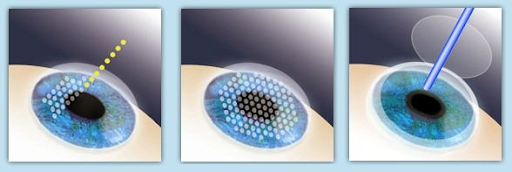
LASIK eye surgery is a popular and effective operation that can help people with refractive problems such as nearsightedness, farsightedness, and astigmatism improve their vision. Only some people, however, are suitable candidates for LASIK. So let us talk about why LASIK eye surgery isn’t for everyone and what characteristics make someone a suitable candidate for the treatment.
LASIK eye surgery is a refractive error correction treatment that uses a laser to reshape the eye’s cornea. The cornea is the transparent front section of the eye that covers the iris and pupil, and its shape is essential in concentrating light on the retina at the back of the eye.
LASIK involves the surgeon utilizing a microkeratome or a femtosecond laser to form a thin flap in the cornea. After that, the flap is lifted, and the underlying cornea is reformed using an excimer laser. The flap is then repositioned, and the eye is left to heal.
Why isn’t LASIK eye surgery available to everyone?
While LASIK is a safe and effective operation for most people, some reasons can make someone an unsuitable candidate. Here are some of the reasons why LASIK eye surgery is not appropriate for everyone:
Thin Corneas
The cornea is reshaped by removing a small quantity of tissue during LASIK eye surgery. If a person’s cornea is too thin, there may be insufficient tissue to remove safely, and the surgery may be ineffective. In some situations, a person’s cornea is too thin to form a flap, which is required for the LASIK operation by lasik surgeon (http://www.visualaidscentre.com/lasik-eye-surgery-in-delhi/). Other techniques may be more appropriate in some instances.
Dry eyes
Dry eye is a typical LASIK adverse effect, which might be aggravated in patients with the problem. If a person has severe dry eyes, LASIK can exaggerate their symptoms. In certain circumstances, seeking alternate procedures or treating the underlying dry eye disease may be preferable before pursuing LASIK.
Pregnancy
Pregnancy and breastfeeding can produce hormonal changes in the body, which might impair vision. Furthermore, drugs routinely used during LASIK are not advised during pregnancy or nursing. For these reasons, LASIK is usually not performed on pregnant or lactating women.
Infections or illnesses of the eyes
Those with current eye infections or disorders, such as keratitis, uveitis, or glaucoma, should avoid LASIK. These diseases can impede healing and raise the risk of complications following surgery.
People under 18 are generally not suggested for LASIK since their eyes are still maturing, and their eyesight needs to be steady. Furthermore, their eyes may alter as people age, making LASIK less effective. Other procedures may be more appropriate for older adults in some instances.
Prescription-strength
Individuals with severe nearsightedness, farsightedness, or astigmatism may be unsuitable for LASIK. This is due to the possibility that the procedure will not repair their eyesight, and they will still require glasses or contact lenses after surgery. Other techniques may be more appropriate in some circumstances.
How to find out if you are eligible or not for Lasik
Although LASIK can improve vision and minimize or eliminate the need for glasses or contact lenses, surgery does come with some concerns, including dry eye. Before deciding, it is important to examine yourself to determine whether you are an eligible candidate for lasik.
Thorough eye checkup.
A complete eye exam with a trained eye doctor or surgeon is the first step in establishing if LASIK is correct for you. During the exam, the doctor will assess your vision and eye health to see if you are a good candidate for LASIK. They will also review your medical history, current medications, and any pre-existing diseases that may impact the procedure’s outcome.
Medications
Those with mild to moderate refractive problems benefit the most from LASIK. If you have a high prescription, LASIK may not be able to restore your vision completely, and you may need to continue wearing glasses or contact lenses following surgery. Furthermore, because their eyes are still maturing and their vision needs to be steady, LASIK is generally not suggested for those under 18.
The thickness of your corneas
The cornea is reshaped via LASIK by removing a small quantity of tissue. If your corneas are too thin, there may not be enough tissue to remove safely, and the treatment may fail. In some situations, a person’s cornea is too thin to form a flap, which is required for the LASIK operation. To establish if LASIK is a good option for you, your eye doctor will measure the thickness of your corneas.
Lifestyle and employment
Those with active lives or vocations that need good eyesight, such as sports, pilots, and first responders, may benefit from LASIK. However, LASIK may not be ideal for you if you participate in contact sports or have a job that puts you at risk for eye damage. Your eye doctor can assist you in determining whether LASIK is a good fit for your lifestyle and career demands.
After Lasik effects
If you are a lucky candidate and become eligible for lasik, you can quickly go through the lasik surgery; so here are some things you should do after going through lasik surgery to take care of yourselves; they also help with the healing process after the lasik surgery.
Take proper rest
Resting for a few days following LASIK surgery is critical to allow your eyes to recuperate. Lifting heavy objects, exercising, or swimming should be avoided for at least a week after surgery. Avoid rubbing your eyes since this might irritate them and raise the risk of infection.
Follow medications regularly
After LASIK, your surgeon will prescribe eye drops to help your eyes heal and reduce inflammation. Taking these drops exactly as directed is critical because they can help prevent infection and alleviate discomfort. Your surgeon may also advise using artificial tears to moisten your eyes and minimize dryness.
Use Eye Protection
Use protective eyewear, such as sunglasses or goggles, for at least a week after LASIK surgery to avoid accidental injury. This will help keep dust, wind, and other allergens out of your eyes.
LASIK eye surgery can be a life-changing procedure for many people, but it is critical to consider if it is the best option for you carefully. You may decide whether LASIK is the best option for enhancing your vision by examining your prescription, age, corneal thickness, eye health, cost, and lifestyle. Make sure you consult with.








